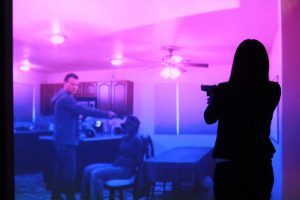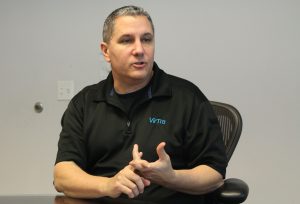- Slug: BC-CNS-Police Simulator,900
- Photos available (thumbnail, caption below)
By ADRIANA BECERRA
Cronkite News
TEMPE – The man standing in front of me pants as he holds a gun to a blindfolded woman’s head.
I’m told to diffuse the situation, so I begin telling the man to put the gun down. He yells obscenities. The woman cries. Out of sight, a baby wails.
After 15 seconds of trying to get the man to drop his weapon, he shoots the woman, then points the gun directly at me. Before I can put my finger on my weapon’s trigger, he shoots.
I failed my mission at Tempe-based VirTra, a company that has developed a multi-screen virtual training simulator now used by police statewide. The Arizona State Legislature approved a $2.1 million grant to install and maintain seven of the simulators throughout Arizona.
Company officials said their training facilities differ from traditional police training simulators because they’re more realistic, using more screens surrounding the trainee, live interaction and additional physical “stress.”
The Arizona Police Association had recommended the system to legislators.
Levi Bolton, executive director of the association, said they chose VirTra because the realism of the 300-degree environment, which uses five screens instead of the usual one-screen training.
Scott Dilullo, federal law enforcement business development manager at VirTra, said competitors are just now starting to incorporate multiple screens.
Dilullo said that’s not the only reason VirTra stands out.
“Historically, what we’ve trained on in law enforcement is a lot of ‘shoot, don’t shoot’ type decision making and that’s not what this simulator is,” Dilullo said. “It’s very multifaceted from verbal skills, de-escalation, officer presence, report writing, decision making, less lethal, all the way up, including deadly force.”
A military training expert watches the officer participating in the simulation and can manipulate the scene. The expert can introduce new characters and make the characters act in certain ways based on the decisions the officer makes.
In a scene with an active shooter, if the training expert doesn’t believe the officer has successfully defused the situation, he or she can make the character shoot other characters or even shoot at the officer.
“It’s very, very difficult to get experiential training,” Bolton said. “With a virtual training dynamic, you can alter paths and training scenarios. They can elevate the set of circumstances.”
Officers also wear a device that sends an electronic impulse to replicate pain and stress if an officer gets hit or injured in a scene.
“In law enforcement, we can’t just say, ‘Time out. We don’t want to play anymore,’” Dilullo said. “We add a stress component. We add a fear response component.”
The Department of Public Safety oversees the allocation of the $2.1 million grant to VirTra. With the grant, the department will purchase seven systems, each costing about $277,000 for the training simulator, monitoring, kits, hardware and software to be installed in an existing facility.
Bolton said this would ultimately be cheaper for taxpayers because it would reduce the need for live fire training and the costs associated with it, like having to decontaminate ranges or buy bullets, which “is a stellar cost.”
Ultimately, Bolton said these training programs are most important for smaller jurisdictions that “don’t have the money for the high-tech training.”
Dilullo said officers are scrutinized for every decision they make without adequate training to prepare them.
Dilullo points to the current political climate as the main catalyst for departments seeking better training.
“You’re seeing, based on what’s happening in the country … with all these shootings and all these incidences, that departments are understanding that they need to find innovative, better ways to train their officers,” Dillulo said.
In 2016, there were 50 deadly police shootings in Arizona, with 963 fatal police shootings nationwide, according to a database created by the Washington Post.
Bolton said that firearm training is a “perishable skill,” one that needs constant training.
The Department of Public Safety is installing a 300-degree VirTra simulator at training academies or police departments in Phoenix, Mesa, Taylor, Prescott Valley, Tucson, Lake Havasu City and in the department’s headquarters.
VirTra, founded in 1993, also has a 300-degree simulator at its headquarters, and police, military and civilians use it for defense and concealed carry training.
Dilullo said the company has no plans to expand outside of Arizona.
^__=

